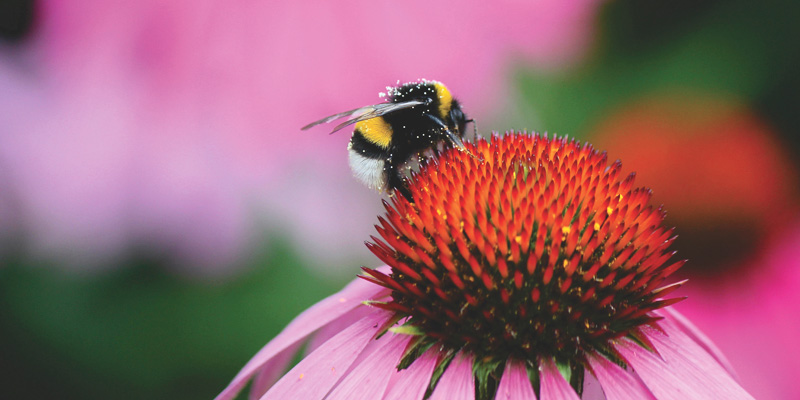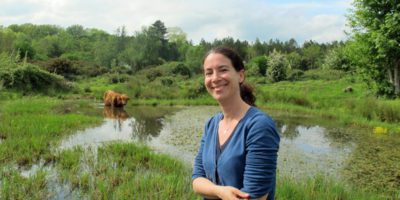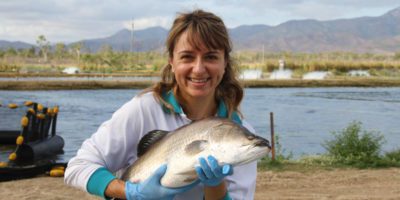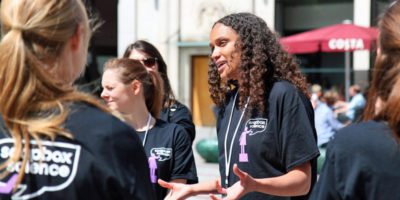Dr. Beth Nicholls is a postdoctoral research fellow specialising in bee behaviour and pollinator conservation at the University of Sussex, where she is currently researching the effects of pesticides on bumblebees and solitary bees. She is passionate about science communication and encouraging young people into STEM careers, particularly those from groups which are currently under-represented in the science community.
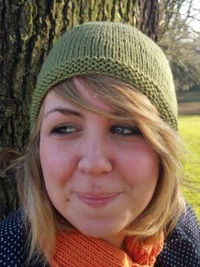
Beth is co-organising the Brighton Soapbox Science event, which takes place on Saturday 29th July 2017 at 1pm at The Deck, Brighton Seafront.
Being into bees
Not to sound like the most Brighton of hipsters, but I’ve been into bees since before they were cool! Even at school I was fascinated by insects, which do all kinds of weird and wonderful things to stay alive and find a mate.
Bees in particular are capable of some amazing feats, such as communicating with each other about where to find the best food, and navigating back to the hive over really long distances. For my Ph.D. I focused on the little understood question of what bees learn when they collect pollen from flowers and if bees can tell a ‘good’ source of pollen from a ‘bad’ one.
After completing my thesis in 2012, I decided that I wanted to use my understanding of bee behaviour to answer more applied questions, and moved to Rothamsted Research to assist with a study on the effects of disease on bee navigation, before moving to the University of Sussex in 2014 to work in Professor Dave Goulson’s lab on a project investigating the somewhat controversial question of the role of insecticide use on bee declines.
Bees keep me busy
As a scientist that works on bees, in spring and summer when bees are most active, I’m usually very busy collecting data. The majority of my research is conducted in the lab, where I monitor effects of pesticide exposure on bee development and behaviour.

I often have a lot of bee colonies to check and feed which can take up most of the day! I also spend time mentoring students who undertake research placements in our lab. Each week we have a departmental talk given by a visiting researcher and I really enjoy hearing about the diversity of research occurring across different institutions. The rest of my time is spent analysing data and writing research articles, most of which is completed in the winter months when the bees are hibernating.
The unexpected link between insects and chocolate
The majority of flowering plants around the world rely on pollination by insects in order to reproduce. Bees are one of the most important groups of pollinator, and a large proportion of the food eaten by animals, ourselves included, would not exist, or would suffer severe yield losses, were it not for bees and other insects.
This includes fruits such as cherries and apples, and, perhaps most importantly, chocolate! Therefore, pollinating insects play a vital role in the functioning of natural ecosystems and the maintenance of global food security.
‘Soapbox by the Sea’
I first heard about Soapbox Science not long after I moved to Sussex and thought it sounded like a brilliant and novel way to engage people with research while at the same time promoting the visibility of female scientists. I applied to speak at the London event (I didn’t get in!) but I also thought it was something that would prove very popular in the buzzing town of Brighton, so the following year instead of reapplying as a speaker, I volunteered to bring the event to the South coast.
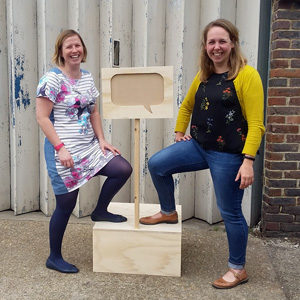
Coincidentally, Dr. Katy Petherick, the Life Sciences Public Engagement Coordinator, had also written to the organisers saying that she’d like to bring the event to Brighton, so they put us in touch and we met for the first of many coffees to discuss the event and start planning when and where to hold it. We both agreed that ‘Soapbox by the Sea’ had a great ring to it and decided we must hold our event on the seafront itself!
We also set about recruiting a committee to help share the workload, and we now have a fantastic team, made up of Ph.D. students, postdocs, faculty members and administrative staff. Oh, and a male physicist! Our committee meetings are a lot of fun, everyone has played their part in securing funding, equipment and food for the event, and even though the big day is still a few months away, Katy and I have already had the chance to meet a lot of brilliant women along the way.
The importance of bringing science to the people
The aims of Soapbox Science are two-fold: To engage the public with science and to raise the profile of women working in STEM fields. A great thing about Soapbox is that it has no target demographic – it’s for everyone! Indeed, at previous events held in other cities, the majority of attendees stumble across the speakers when out and about, rather than having planned to come along to the event, so Soapbox really does bring science to the people.
The interactive nature of Soapbox Science gives the public a rare opportunity to pose questions directly to the experts, and Katy and I hope it will help to showcase the brilliant scientific work that is being conducted by female scientists working on the south coast, providing much needed female role models to anyone hoping to pursue a career in science.
Power to the people! Using citizen science to help source data
Two years ago, the Goulson Lab set up The Buzz Club as a way to educate people about declines in pollinator numbers in a fun and engaging way, by giving people the opportunity to become scientists themselves and help us collect important data on insect populations.
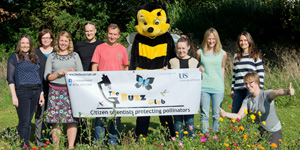
As individual scientists, we are very limited in how much data we can collect and the area which we can cover, but by harnessing the power of citizen science we hope to build a database of long-term pollinator population trends, data which is vital to conserving these important insects, but which is currently sorely lacking.
Our members are also helping us to test out the effectiveness of some simple, low cost habitats that can be built in gardens or school grounds to provide a home for insects, such as hoverfly lagoons and solitary bee homes. By engaging with The Buzz Club projects, we hope that people will gain a better awareness of and appreciation for the natural world, as well a greater understanding of scientific methods.
Help from Athena SWAN
Unlike many other fields of science, women actually outnumber men in the biological sciences, at least from undergraduate to lecturer level. However, beyond this there is a considerable drop in the number of women filling more senior roles, and only around 25% of professors in my field are women.
Within my own department, the absence of women in even entry level faculty positions is striking. However, a very positive outcome of the introduction of the Athena SWAN charter at Sussex has been the initiation of a mentoring circle scheme for female post-doctoral staff, which has given me the opportunity to meet and chat with other female researchers at a similar career stage to myself, as well as providing me with much needed advice and support from female researchers in more senior positions across the University.
Coming up next
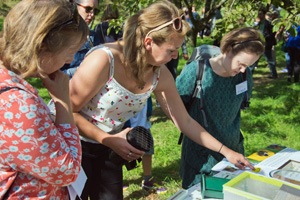
I have just started an exciting new project that aims to quantify domestic pesticide use in gardens and allotments, which is currently completely unregulated. Our preliminary data suggests that bees and other pollinating insects may be exposed to pesticides through the use of these sprays in people’s gardens, yet we know very little about the severity and implications of such exposure.
Team Pollinate is also a ‘citizen science’ project and involves working with allotment holders in Brighton who have volunteered to collect data on the types of pollinator visiting their plots, as well as keeping records of the amount of food they harvest from their allotments, and any pesticides they use.
Excitingly, we are also collaborating with science policy and sustainability researchers within the University of Sussex to understand more about attitudes to pesticide use, as well as ecologists in India, who are co-ordinating similar citizen science experiments with urban farmers in Kolkata, to quantify the need for pollination in urban food production in a developing country.
http://www.sussex.ac.uk/profiles/339798

